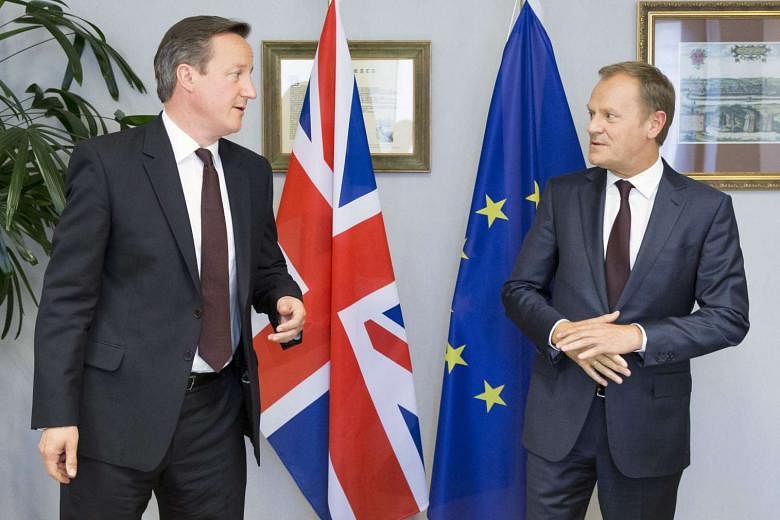LONDON • The European Union (EU) has formally abandoned the founding principle that all of its members are heading towards ever closer integration, only at different speeds.
But whether that will be enough to enable British Prime Minister David Cameron to win a referendum perhaps as early as June on maintaining Britain's membership of the EU remains to be seen, given hostility in his Conservative party and the depth of public anxiety about immigration.
A draft deal negotiated by EU authorities with the aim of keeping Britain in the 28-nation bloc recognises for the first time that some countries do not share the objective, enshrined in the 1957 Treaty of Rome, of "ever closer union" and may never go further in political integration. A legally binding decision up for approval by EU leaders says references in the bloc's founding treaties to an ever closer union among the peoples of Europe "do not compel all member states to aim for a common destination".
In other words, member states will no longer be obliged to order the full set menu at European Commission president Jean-Claude Juncker's restaurant, but have a recognised right to pick and choose their courses.
The text makes explicit a long-term shift in Europe's architecture towards a two-tier or multi-tier system, with the 19-nation euro zone destined to move towards deeper political and economic integration even as others stand aside.
Until now, the Brussels orthodoxy had been that all members of a "two-speed Europe" would eventually participate in all European policies, but at their own pace.
-
Package's key points
-
The head of the European Council, Mr Donald Tusk, has unveiled a draft reform package to help keep Britain in the European Union, with the following key points:
MIGRATION BENEFITS
Without changing treaties on free movement of labour and barring discrimination, the EU proposed an "emergency brake", limiting those fundamental rights where vital national interests or economic stability are at risk.
EURO ZONE
The EU said on Tuesday that no British company or citizen would face discrimination because they use the pound as a currency. The EU is also offering Britain a way to slow down euro zone legislation that it does not like, although it does not offer any veto rights on euro zone decision-making.
NATIONAL SOVEREIGNTY
The Tusk package explicitly states that Britain is not committed to further political integration into the EU. The EU also offers to allow a simple majority of national Parliaments to stop legislative proposals from the Commission.
COMPETITIVENESS
The least contentious British demand for less red tape and more economic dynamism has broad backing so a set of declarations will echo EU policy, but with elements to show Britain that Brussels is listening.
Britain is already the most semi-detached of EU members. It has opted out of the euro and the Schengen zone of passport-free travel and participates in judicial and police cooperation on an "a la carte" basis.
EU officials are keen to avoid the terms offered to Britain triggering a "me too" wave of efforts by others, such as Poland, to row back on existing commitments. Poland, Hungary, the Czech Republic, Romania and Bulgaria all bound themselves in their EU accession treaties to join the single currency once they meet the economic criteria.
Since the euro zone's debt crisis, most have stalled preparations.
At Britain's behest, the text recognises that "not all member states have the euro as their currency" but it avoids undermining the others' obligation to join. Warsaw's new euro-sceptic government has said it does not intend to adopt the euro during its four-year term.
Mr Cameron secured concessions on a range of demands, from more say for national parliaments, to denying welfare benefits to new EU migrants arriving in Britain, and a procedure to make it harder for euro zone countries to outvote non-euro members.
Mr Cameron urged MPs yesterday to unite behind his drive to agree on the EU reforms at a Brussels summit next month ahead of Britain's EU membership referendum. "Let's fight this together," Mr Cameron said as he defended a series of draft proposals put forward by European Council president Donald Tusk on Tuesday that have angered euro-sceptics from his own Conservative Party.
"I do believe that with these draft texts... Britain is getting closer to the decision point," he said in a parliamentary debate on the issue.
Mr Cameron did not give a timing for the referendum, but when asked about June 23 - which has been mooted in newspaper reports - he said it would not be too soon after regional elections on May 5.
But opposition to the latest deal from euro-sceptics in London was stiff, with lawmaker Steve Baker accusing Mr Cameron of "polishing poo", exposing the acrimony surrounding the campaign ahead of the in/out referendum on EU membership.
British newspapers were also scathing. "Cameron's EU deal is a joke" was the headline of the Daily Express, while the Daily Mail called it "The great delusion!" The Daily Telegraph reported that Cabinet ministers were threatening to rebel over what it described as a "watered-down" deal.
Even Mr Cameron's political ally, London mayor Boris Johnson, criticised reports of a proposed "red card" for national parliaments to block EU laws. Mr Johnson said he had "doubts" about the mooted system, adding that he believed there was "much, much more that needs to be done" on EU reform.
"I think what would be better would be if we had a brake of our own that we were willing to use... That's what we should be able to do," he said on LBC radio.
As part of a charm offensive, Mr Cameron is visiting Poland and Denmark tomorrow, then Germany next week for talks with Chancellor Angela Merkel.
REUTERS, AGENCE FRANCE PRESSE

